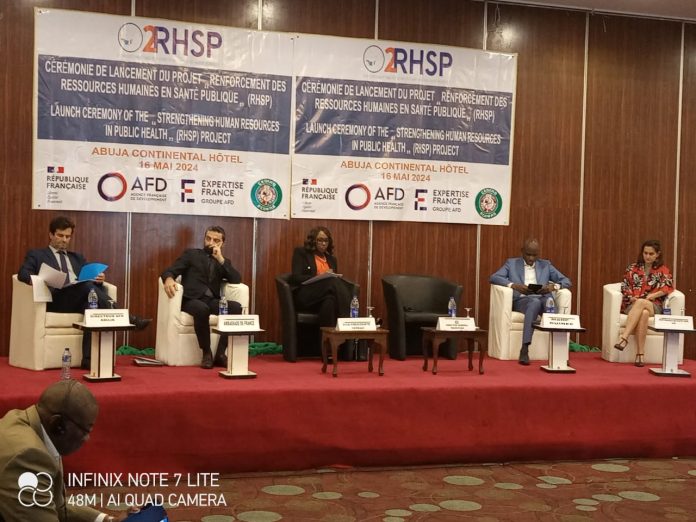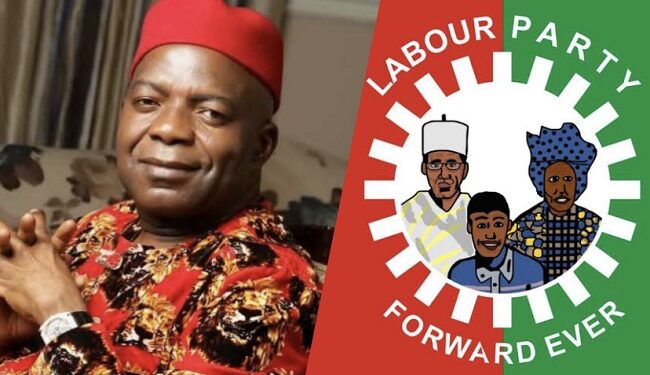Jean-Francoois Hasperue, Charge d’Affairs, French Embassy Abuja, has stressed the need to support the development of resilient health systems that are able to anticipate, prepare and respond to public health emergencies across countries in the West Africa sub-region.
Hasperue made this known during the launch of the strengthening of RHPH Project at the Abuja Continental Hotel on Thursday.
According to him, there is a crucial need to support the building of strong national and regional public health institutions able to prevent and manage current and future health threats.
He said,”I am very pleased to officially launch today the project “Human resources in Public Health” financed by the French Development Agency (AFD) and implemented by Expertise France in close partnership with the West African Health Organization (WAHO).
“As we are all aware, the COVID-19 pandemic shed a brutal light on the weaknesses caused by the lack of investments in health systems. There is a crucial need to support the development of resilient health systems, able to anticipate, prepare and respond to public health emergencies. This is one of the priorities of France as stated in its new Global Health Strategy that was disclosed in October last year.
“The COVID crisis also demonstrated that strengthening health systems alone will not be enough to fight emerging health threats. Indeed, a “One Health” Approach, taking into account the interrelations between the health of people, animals and the Planet ecosystems, is needed.
“Therefore, France is aiming to support the building of strong national and regional public health institutions able to prevent and manage current and future health threats. As you all know, threats linked to environmental degradation (climate change, biodiversity loss, microbial resistance, pollutions etc.) affect all countries in the world with a rising frequency and severity. We not only need to build resilient health systems but also strong “systems for health”.
He added,”To do so, France is committed to ensuring a multi-disciplinary and coordinated response to health emergencies.
“Health security relies on qualified human resources for health who will be able to adapt to evolving needs. The shortage of health workforce is a global issue but is nowhere more felt than in Africa. By 2030, the projected global shortage is about 10 million health workers (WHO). This is why France has made it as number 1 priority of its global Health strategy. The project we are launching today is a concrete example of this commitment.
“This project is also a new step in France’s partnership with ECOWAS and its specialized agency: the West African Health organization. This partnership has been built since 2016 around three main areas of collaboration: 1) health security, 2) reproductive and maternal health, and 3) the development of human resources for the sector and the region. In these dellicult to we in the we gia, EcoWN is one ukion the 7.
“Let me conclude by wishing a very successful implementation to WAHO Ev and Expertise France Teams for the benefit of the whole West African Population.”
In his remarks, Xavier MURON, Country Director Nigeria, Agence Francaise De Development (ADF) said,“The COVID-19 pandemic shed a brutal light on the weaknesses caused by the lack of investments in health systems. There is a crucial need to support the development of resilient health systems, able to anticipate, prepare and respond to public health emergencies.”
He said the project launched is a perfect illustration of the key priorities of the French Global Health strategy that was launched in October last year: health security through a One Health Approach
Mr Muron noted that it is a new testimony of the France willingness to support the effort of regional institutions in their essential mandate, adding that it puts the emphasis on France’s priority to support the development of quality human resources to support resilient and strong health systems for the benefit of the West African people.
He put the cost of implementing the project at 4.5million euros.
Also speaking, Madam Damtien L. Tchintchibidja, Vice President, ECOWAS Commission gave insight into the programme after the launch, explaining that it is meant to help to build capacity, defend health sector, train health practitioners, to minimize brain drain in medical sector, among other interventions.
She said as a starting phase, it involves three states of Benin, Togo and Guinea out of the 15-member states of the ECOWAS states, adding that it would be extended to other member states depending on extent of mobilisation of funds.
According to her, “It is very important to the West African countries as you know that it is being implemented by the West African health implementation, WAHO in collaboration with our partners, the French Agency for development. It is significant because it is strategically to help build capacity in the health sector and to help us to retrain our health personnel within our region.
“The project is starting first with three countries: Benin, Togo and Guinea as the first three countries that will be benefiting from this financing and it is billed for a period of four years and it is 4.5 million Euros annually over the four years period.
“You know our Commission is made up of 15-member states, you have to start somewhere as you cannot do all countries at once. This is the first countries we are starting with and we are also calling on other partners to join us in order to help boast this project so that we can extend it to other members states as well.
“The next stage will depend on the finance we have been able to secure in order to expand the project to other members states.
“It is to reinforce our capacity, defend our health sector, it will train practitioners because we have brain drain of our health practitioners as you can see that a lot of our youths we have invested so much in acquiring education in the health sector tend to leave and move on to more developed countries like US, Canada and various countries in Europe.
“So, this is to mobilise them within our countries and help to improve our health sector in various countries in region.”
She congratulated Dr. Melckjor Athanase AÏSSI, Director General of WAHO for the laudable initiative aimed at supporting member States in their efforts to face the numerous challenges in health matters.
She recalled that the EBOLA epidemic which wreaked havoc mainly in Guinea, Sierra Leone and Liberia, as well as the COVID-19 pandemic revealed the fragility of ECOWAS member states health structures.
“It was following the Ebola epidemic that ECOWAS decided to opt for a thematic approach in its early ECOWARN mechanism which includes health with a focus on not only epidemics, pandemics but also our health infrastructures in member states.
“It goes without saying that any initiative aimed at strengthening the capacities of health personnel in our States should be strongly encouraged. Sustainable economic and social progress is only possible with well-developed human capital.”



